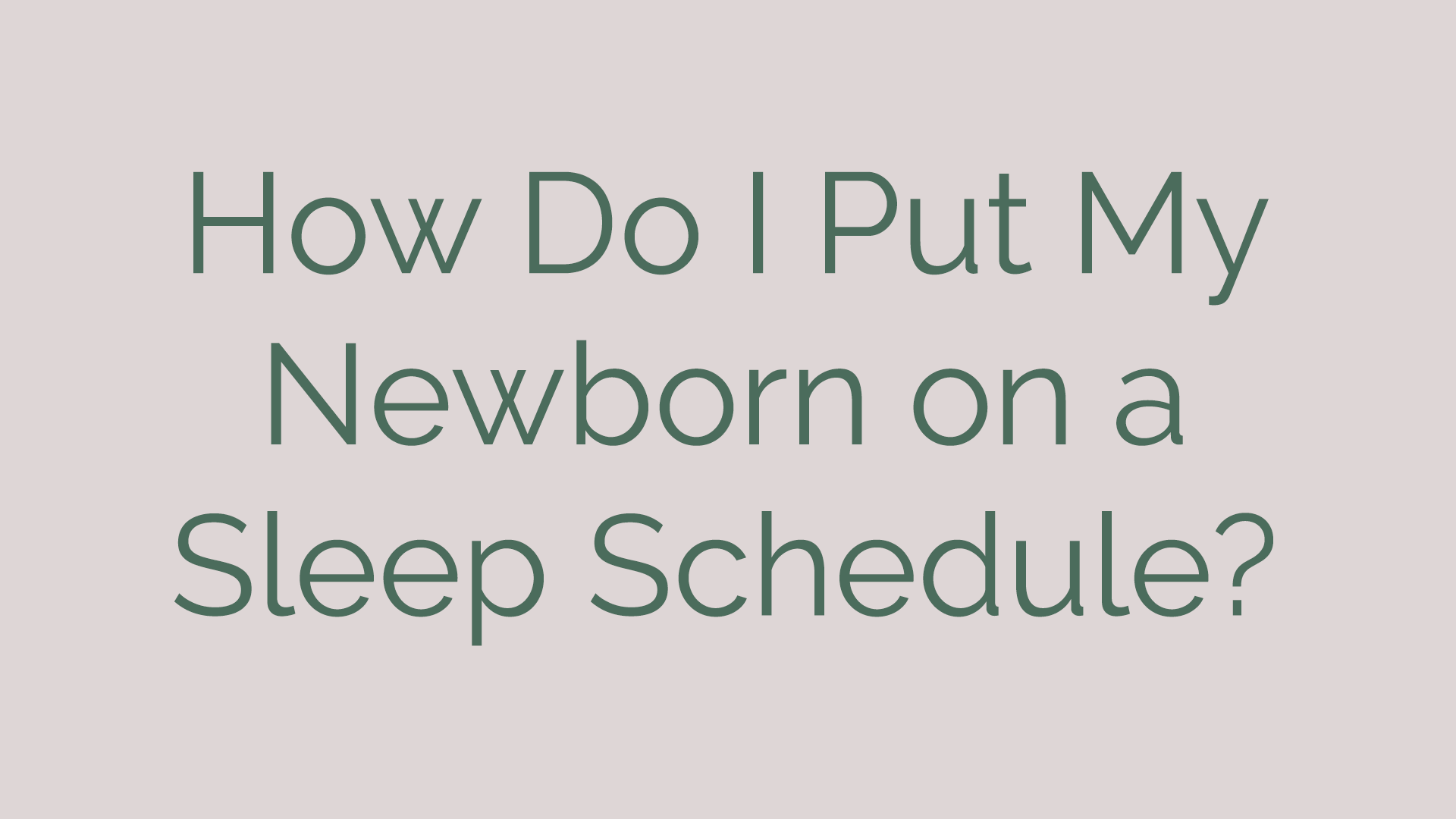Sleep training can begin anytime a child is 16 weeks of age or older, counting from their due date. However, many families wonder about baby sleep training for newborns. Over the years, I’ve given parents tips about how to get their newborn sleeping longer stretches at night. And also how to establish better sleep habits with their newborn from the start. Baby Sleep Trainer even has a robust and affordable online Newborn Sleep Program. This program ensures families can learn everything I’ve learned about this period of sleep in a child’s life. And yet, the question still remains, how parents can sleep train a newborn?

Photo Credit: Lisa Fotios
Why Wait Until 16 Weeks
As any parent can attest to, newborns can come into the world needing to work out any number of issues. Even a perfectly healthy baby may have issues nursing, latching, or digesting breast milk. They may have painful reflux or colic, or perhaps they are jaundiced. Their chemical processes are not fully established when they’re born. It takes time for their brain to regulate hormonal outputs.
Newborns do not have regular excretions of melatonin (the sleep hormone), especially during the day. This regulation occurs somewhere between the 3rd and 4th month of life. Once the milestone of regular melatonin output is reached, it can take still take a few weeks beyond that for baby’s ability to establish a regular sleep pattern. Generally speaking, this evens out for all babies around 16 weeks of age from birth. This is why we wait until that time to sleep train. While you can establish some great sleep habits as a newborn, you shouldn’t worry too much about putting your newborn on a schedule during the first weeks of life.
Why Attempting Early Sleep Training is Hard on Mom
Regardless of my recommendation, many parents will ignore my expertise, and attempt to sleep train early anyway. While families may experience some success in teaching their child to fall asleep without help, they will also notice that in many cases their child will need multiple naps each day. Most often when babies take 4-5 naps each day, they are not able to sleep long stretches overnight. This is not the case for every baby, but for most.
Because newborns genuinely need to fall asleep many times each day, and thus cannot reliably sleep long stretches at night, Mom can feel like a failure. I believe sleep coaches with much less personal, hands-on experience than me have written books that make families think early sleep training is the way to go. In my extensive experience, early sleep training places undue stress on Mom. And she typically exerts an enormous amount of energy trying to get her baby to do something baby is not biologically ready to do.
Why Attempting Early Sleep Training is Hard on Baby
Can you imagine how hard it must be for a child to be asked over and over again to learn to ride a two wheel bike when they are only 2 years old? While it may be possible in some very rare cases, most toddlers are too cognitively immature to learn to ride a two wheel bike at such a young age. Even if they figured out how to ride their bike, could they be trusted to follow you down a busy street and remain in the bike lane? There is so much more to sleep training beyond learning to sleep without sleep props.
A proper and age-appropriate nap schedule is vital as well. Newborns, when asked to adopt a sleep training program that is not age-appropriate, can produce a lot of stress and crying. And often not a lot of positive results.
What Can I do Right Now?
Perhaps your newborn is waking often at night, or will only sleep in your arms. Or, perhaps won’t really nap well at all! Sprinkled throughout this blog post are various links to other articles to help you work through whatever is happening with your baby.
Remember, the Newborn Sleep Program has helped hundreds of families establish excellent sleep habits early on. It is not uncommon for younger infants to sleep 5, 6, or even 8-10 hours overnight! Not all babies may be capable of that, but many are. Also, newborns are capable of accepting a daily pattern of eating and sleeping, even if they’re not ready for a schedule.
When it comes to baby sleep training for newborns, remember:
- Infants can be sleep trained any time 16 weeks of age or older.
- Trying to start sleep training early can backfire. Young infants may not be able to do what is needed in order to be successfully sleep trained.
- Early sleep training can cause a ton of stress for mom, including feeling like a failure.
- Early sleep training for infants is possibly like asking them to do something they physically and cognitively are incapable of doing.
- But! I have a program to help your newborn establish great habits early on, and sleep as long as possible overnight.





Hi Natalie,
So I have enrolled to the Newborn Program, read about sleeping and napping on your blog and followed the rules as much as possible (breaking feeding-sleeping pattern, dark room, white noise machine, no more than 2 hr nap etc.). My son is 9 weeks old now, he is a fantastic kid with plenty of energy (if not too much), he is capable of falling a sleep in a crib without a prep (occasionally I have to shushh-pat him) 🙂
There are 2 matters that I couldn’t find advice on:
1. short & not frequent naps: I read that it is ok. for the newborns to not sleep longer than 1 cycle, and that at his age 4-5 naps are expected… well… my kid on a good day has 1 nap (1 hour) + 2 naps 30min each. Though, often goes with only 2 naps.
2. He sleeps from 7pm to 2-ish am. – What would be advisable after a child wakes up at 2am? I tried rocking, cuddling, even feeding him to sleep, but that doesn’t work, he falls a sleep for max 20 min and then is all “crispy” again… which for me means that my day starts at ~2am.
Please, could you help? Do you have any advice?
Is it normal for a newborn to sleep so little?
Is it possible to increase no of naps or its length?
How to approach a kid waking up around 2am with no intention to fall asleep again?
Thanks 🙂
Hi Natalia!!
1. short & not frequent naps: I read that it is ok. for the newborns to not sleep longer than 1 cycle, and that at his age 4-5 naps are expected… well… my kid on a good day has 1 nap (1 hour) + 2 naps 30min each. Though, often goes with only 2 naps.
Yep! Whatever he’s doing is normal and okay – as long he’s healthy and growing.
2. He sleeps from 7pm to 2-ish am. – What would be advisable after a child wakes up at 2am? I tried rocking, cuddling, even feeding him to sleep, but that doesn’t work, he falls a sleep for max 20 min and then is all “crispy” again… which for me means that my day starts at ~2am.
This is just the way things are sometimes for newborns. Keep him in the dark with white noise until 7 am and do whatever you can, that is safe, to get him to sleep from 2 am until 7 am. It may be time to swap nights with a partner on occasion, so you can get sleep <3 Even if they work during the day...so do you 🙂
Is it normal for a newborn to sleep so little?
As we talk about in the program, almost anything a newborn does is "normal", provided they are growing and thriving <3 They really do have a hard time regulating their sleep because their brains are so immature.
Is it possible to increase no of naps or its length?
Not beyond what you're already doing.
How to approach a kid waking up around 2am with no intention to fall asleep again?
See above <3
Hi Natalie,
Thank you so much for your reply… short update: at the moment the thing that works most between 2 and 7am is practically attaching my son to my breast while sleeping next to me, I am just worried that it can be super confusing for the LO that it is not o.k. during the day, yet “allowed” at night…
Cheers,
Natalia
There really isn’t anything that is or isn’t “allowed” at this stage. As long as baby is healthy and thriving, you can do whatever you need to get him and you sleep. There are best practices and suggestions, but at the end of the day you need to do what needs to be done. Until he can be formally sleep trained, that’s the only approach you can take.
Hi Natalie! I am so grateful for your advice here and in the program. My baby is taking so well to the EWS routine and sleeps well in his bassinet at night. Creating a proper sleep environment and getting him napping after about an hour of wake time also has been sooo helpful. The moment I get him swaddled and in his room with white noise, he begins fading and just needs a little rocking/pacifier to get to sleep. My only problem is that I cannot get him to nap in the daytime unless he is in my arms. He routinely wakes in his bassinet every 15-20 minutes but can sleep 30 minutes – 2 hours if he’s on my lap. I don’t sleep and he’s safe, but I feel trapped all day with no breaks. He’s 11 weeks old. Is there anything I can do before the 16 week sleep training to get him to sleep longer stretches in his own bed during the day?
Hi Julie!!
Yes, this is SO normal!! You can try to put effort into helping him link sleep cycles in the crib, but frankly it may not work and it may not be worth the effort. I do 100% appreciate not having breaks and if you have ANY friends that offered help when you had the baby now would be the time to call them in to hold baby while they nap, but at this age it can be really hard to get babies to sleep in cribs/bassinets if they are being helped to sleep at the onset of sleep (which is TOTALLY normal for newborns).